
Related
February is African American History Month. It begins with the birthday of the great American poet, Langston Hughes, born February 1, 1902. Hughes’s career spanned the Harlem Renaissance of the 1920s to the Black Arts Movement of the 1960s. Langston Hughes was the most prolific Black poet of his era.
Although he died in 1967 at the age of 65, his work endures, like the famous poem, “A Negro Speaks of Rivers,” which he wrote at the age of 18, and “Dream Deferred.” Lorraine Hansberry took a line from this poem — “a raisin in the sun” — and made it the title of her groundbreaking play.
Among Langston Hughes’s many works was his book Black Magic: A Pictorial History of African Americans in the Performing Arts. He co-wrote it with Milton Meltzer. Meltzer collaborated on several projects with Hughes and ultimately decided to write his biography, which he continued after Langston Hughes died. It’s published by Millbrook Press.
Transcript
AMY GOODMAN: You’re listening to Pacifica Radio’s Democracy Now! I’m Amy Goodman.
February is African American History Month. It begins with February 1st, yesterday, the birthday of the great American poet Langston Hughes. Hughes was born in Joplin, Missouri, on February 1st, 1902. Today we’re going to take a look at his life, at a career that spanned the Harlem Renaissance of the '20s and the Black Arts Movement of the ’60s. Langston Hughes was the most prolific Black poet of his era. Today we'll begin with a conversation that Langston Hughes had — really, a talk — that was recorded by the BBC more than 30 years ago, and then we’ll speak with one of his biographers. Langston Hughes.
LANGSTON HUGHES: I pick up my life
And take it with me
And I put it down in
Chicago, Detroit,
Buffalo, Harlem,
Any place that is North and East—
And not Dixie.
I pick up my life
And take it on the train
To Los Angeles, Bakersfield,
Seattle, Oakland, Salt Lake,
Any place that is
North and West—
And not South.
I am fed up
With Jim Crow laws,
People who are cruel
And afraid,
Who lynch and run,
Who are scared of me
And me of them.
So I pick up my life
And take it away
On a one-way ticket—
Gone up North,
Gone out West,
Gone!
When I was 13 years old, my mother moved to a town called Lincoln, Illinois. I was in the eighth grade, grammar school. At that time, we didn’t have junior high school, so when you graduated from the eighth grade, you went to high school. In this eighth grade graduating class in Lincoln, Illinois, on the day that I entered, the students were talking about holding a class election. It seems that they had heard that the high school across the street had class officers, so they wanted to have officers, too. Well, the teacher was explaining to the class that day the duties of class officers. She said, of course, that the president had to know how to run a meeting, and secretary had to know how to write, and so on. And then, when she got to the office of class poet, she stressed rhythm. He said a poem must have rhythm.
Well, now, I was a stranger in the class. I had entered about four weeks after the school year had begun. I didn’t know any of the other pupils. They didn’t know me. I was one of two Negro children in that class. A little white boy got up and turned around and looked at me and called my name. And right away the whole class said, “Aye.” Unanimously, I was elected the class poet. So, I came to the conclusion that maybe — poetry, rhythm, color, me, a Negro — that little boy had thought, “He must have some rhythm to give a poem.” And maybe that’s why I was elected the class poet. At any rate, I’m glad that I was.
My earliest serious poem to be published was a poem called “The Negro Speaks of Rivers.” I wrote this poem when I was 18, wrote it on the train going to Mexico just after I had graduated from high school. My father lived in Mexico City. On the train as we crossed the Mississippi River just outside St. Louis, sunset time, I saw this great muddy river flowing down toward the heart of the South, and I began to think about what it had meant to the Negro people in the past, how in slavery time to be sold down the Mississippi was, I had heard, the worst thing that could happen to a slave, because if they sent you down into the rice fields into the Delta, the hot regions around New Orleans, you might not live very long. And then I remembered reading that Abraham Lincoln, as young man, had gone down the Mississippi. He had seen the slave market in New Orleans, the buying and selling of human beings, and he never forgot it. It was Lincoln who, many years later, signed the Emancipation Proclamation that freed the Black slaves. And so, these thoughts went into this poem of mine that I wrote down on this train shortly after we had gone across this river in the sunset. And from Mexico City, I sent the poem to a Negro magazine called The Crisis, the organ of the National Association for the Advancement of Colored People.
I’ve known rivers:
I’ve known rivers ancient as the world and older than the
flow of human blood in human veins.
My soul has grown deep like the rivers.
I bathed in the Euphrates when dawns were young.
I built my hut near the Congo and it lulled me to sleep.
I looked upon the Nile and raised the pyramids above it.
I heard the singing of the Mississippi when Abe Lincoln
went down to New Orleans, and I’ve seen its muddy
bosom turn all golden in the sunset.
I’ve known rivers:
Ancient, dusky rivers.
My soul has grown deep like the rivers.
I went to Columbia University in New York City for a year. I didn’t like Columbia very well. A big university in the very heart of a big city, it didn’t seem to me to have what I thought was a feeling of college life or campus life. And then, at that time, there was prejudice at Columbia. I had difficulty getting a room in the dormitory as a Negro student. And then, being interested in writing, I wanted to become a member of the staff of the Columbia college newspaper, The Spectator. And so, I tried out for it. You had to go through a sort of preliminary test and show some ability. And do you know what they assigned me to? Me, a Negro student? They assigned me to society and fraternity news. They knew very well that I had no access to most of the fraternity houses or dances that the white students went to. And so I was unsuccessful in making the staff of The Spectator.
My father had wanted me to become a mining engineer. By that time, I’d made up my mind that I’d like to be a writer. We didn’t agree on objectives. So, at the end of the year, I wrote my father in Mexico City and told him that I had decided to try to be a writer, and if he didn’t approve of my plans, he needn’t send me any more money. Well, he didn’t send me any more money. I found myself in New York City with only $13 at the end of my college year. And that is what I started out in life on. Ever since that time, I’ve been making my own living. And with this $13, I went down to Harlem, got a room and began to look for a job.
Here on the edge of hell
Stands Harlem—
Remembering the old lies,
The old kicks in the back,
The old, Be patient,
They told us before.
Sure, we remember.
Now, when the man at the corner store
Says sugar’s gone up another two cents,
And bread one,
And there’s a new tax on cigarettes—
We remember the job we never had,
Never could get,
And can’t have now
Because we’re colored.
So we stand here
On the edge of hell
In Harlem
And look out on the world
And wonder
What we’re gonna do
In the face of
What we remember.
I eventually found work on the boats. So I went to sea, made a trip to Africa, all up and down the West Coast. It was there that I saw the meaning of colonialism, because at that time, of course, almost all of Africa belonged to the great European powers. After working on the boats for about two years, I decided one day in Rotterdam that I’d like to see Paris. And I thought perhaps I’d better go see Paris right then and there. I bought a ticket to Paris, got on the train in Rotterdam around midnight, got to Paris at 7:00 in the morning, cold, snowy February morning. I didn’t know a soul in all of Europe. Finally, I got work as a doorman in a nightclub. The salary was your dinner and tips. I finally found another job in another nightclub, a club called the Grand Duke right in the middle of Montmartre. I was employed as a second cook. Well, since I couldn’t cook anything, fortunately, for me, the title second cook really meant dishwasher.
And so, washing pots and pans every night in the kitchen of the Grand Duke, I used to hear the jazz band playing outside in the cabaret part. They had a very good jazz combination from New York, Negro musicians. Musicians like the drummer Buddy Gilmore played there. Kaiser Marshall sometimes was on drums, too. And so, this excellent little band began to draw quite a few people to this club. People like the Prince of Wales, who is now the Duke of Windsor, used to come, and from Hollywood, Anita Loos and movie actress Gloria Swanson. It was a very nice club. Eventually, they brought Brick Top there as the hostess, and she began her European career in this little club called the Grand Duke. Well, while she was singing outside in the club, I would be washing dishes in the kitchen and sometimes thinking out a poem, poems that the critics called jazz poems. So, my poetic career is really all tied up with dishwashing in this little club called the Grand Duke.
The Negro
with the trumpet at his lips
has dark moons of weariness
beneath his eyes
where the smoldering memory
of slave ships
blazed to the crack of whips
about his thighs.
The Negro
with the trumpet at his lips
has a head of vibrant hair
tamed down,
patent-leathered now
until it gleams
like jet—
were jet a crown.
The music
from the trumpet at his lips
is honey
mixed with liquid fire
the rhythm
from the trumpet at his lips
is ecstasy
distilled from old desire—
Desire
that is longing for the moon
where the moonlight’s but a spotlight
in his eyes,
desire
that is longing for the sea
where the sea’s a bar-glass
sucker size.
The Negro
with the trumpet at his lips
whose jacket
has a fine one-button roll,
does not know
upon what riff the music slips.
It’s hypodermic needle
to his soul
but softly
as the tune comes from his throat
trouble
mellows to a golden note.
The very first poem that I sold was a jazz poem. It was a poem about the Charleston. The Charleston was the dance that had begun at the Savoy Ballroom in Harlem, spread to Broadway, was brought to Europe first by Josephine Baker, and then went all around the world. Well, this little Charleston poem of mine and two others, I sent to a magazine called Vanity Fair. That was a very smart New York magazine at that time. And they bought these three poems, and they paid me 50 cents a line. But my three poems were quite short. And when I got the check and looked at it, wasn’t very much money. So I thought to myself, “Well, from now on, I’ll cut all my poetic lines in half and make two out of them and get bigger checks.” So now you understand when you see my poems having very short lines, how I became aware of the value of shortening the line in poetry. Commercial reasons.
I sort of went backwards from an interest in jazz to an interest in the folk roots of jazz. I went backwards from jazz to the blues — and the blues really are the basis of jazz — and to the spirituals, the great Negro folk songs of the same period. And having tried to write poems in the syncopated idiom of jazz, I then began to try to write poems in the folk idiom of the blues and the spirituals. These poems, my blues poems particularly, seemed to attract considerable attention. My first book, published by Alfred A. Knopf, was called The Weary Blues. And ever since that time, I’ve written a number of poems, as nearly as I can make them, in the exact form of the Negro folk blues.
Droning a drowsy syncopated tune,
Rocking back and forth to a mellow croon,
I heard a Negro play.
Down on Lenox Avenue the other night
By the pale dull pallor of an old gas light
He did a lazy sway …
He did a lazy sway …
To the tune o’ those Weary Blues.
With his ebony hands on each ivory key
He made that poor piano moan with melody.
O Blues!
Swaying to and fro on his rickety stool
He played that sad raggy tune like a musical fool.
Sweet Blues!
Coming from a black man’s soul.
O Blues!
In a deep song voice with a melancholy tone
I heard that Negro sing, that old piano moan—
“Ain’t got nobody in all this world,
Ain’t got nobody but ma self.
I’s gwine to quit ma frownin’
And put ma troubles on the shelf.”
Thump, thump, thump, went his foot on the floor.
He played a few chords then he sang some more—
“I got the Weary Blues
And I can’t be satisfied.
Got the Weary Blues
And can’t be satisfied—
I ain’t happy no mo’
And I wish that I had died.”
Far into the night he crooned that tune.
The stars went out and so did the moon.
The singer stopped playing and went to bed
While the Weary Blues echoed through his head.
He slept like a rock or a man that’s dead.
AMY GOODMAN: You are listening to Pacific Radio’s Democracy Now! I’m Amy Goodman. And we’re joined by Milton Meltzer, who was a friend of Langston Hughes, a colleague of his, and who has written a biography of Langston Hughes, called just that, Langston Hughes. It was a finalist for the National Book Award. Welcome to Democracy Now!
MILTON MELTZER: Glad to be here.
AMY GOODMAN: Well, February is African American History Month, which begins with Langston Hughes’ birthday. He was born 96 years ago, on February 1st, 1902, in Joplin, Missouri. Today on Democracy Now!, we’re looking back at his life, remembering Langston Hughes. In 1925, he wrote a poem, which would make him …
MILTON MELTZER: Twenty-three.
AMY GOODMAN: Twenty-three years old, called “I, Too.”
LANGSTON HUGHES: I, too, sing America.
I am the darker brother.
They send me to eat in the kitchen
When company comes,
But I laugh,
And eat well,
And grow strong.
Tomorrow,
I’ll be at the table
When company comes.
Nobody’ll dare
Say to me,
“Eat in the kitchen,”
Then.
Besides,
They’ll see how beautiful we are
And be ashamed—
I, too, am America.
AMY GOODMAN: At what point in Langston Hughes’ life did he write that poem?
MILTON MELTZER: That, too, was written when he was quite young. And again, it voices the discrimination and segregation that his own people and he himself had suffered, you know, for a long, long time. Once when he started in school at one time where his mother had taken him to live, he wasn’t admitted to the school because they had a rule no Black kids could be there, and they had to move to another part of town for him to be able to go to school. And another situation like that, when the school refused to admit him, his mother put up a big fight. And finally the school board consented, and he — as he said afterwards, he, by himself, desegregated that school. And, of course, later, throughout his life, through his 65 years, he experienced discrimination time and again.
AMY GOODMAN: New York was seminal, was a key time and inspiration for Langston Hughes. Can you talk about how he ended up in New York and about the Harlem Renaissance and how he fit in?
MILTON MELTZER: Well, he came to New York originally to go to college here. His father, with whom he had a very difficult relationship, and one that lasted only very briefly on two separate visits to Mexico when he was quite young — his father and he didn’t get along at all, because his father, who had also, like Langston, suffered discrimination, instead of staying to fight it, as Langston put it, he fled. He chose to flee and went down to Mexico, where there wasn’t the same problem of persecution, and became fairly successful as a businessman, owning a ranch and some businesses in the Mexico region. And he wanted Langston to become an engineer, actually. His mind was bent on making money and on escaping, you know, the problems that he himself had had. And when Langston had told him that he wanted to be a writer, he said, “You know, nobody makes a living as a writer,” which was largely true at that time, and, unfortunately, still is true for many writers — most writers, I would say, doing writing exclusively. Finally, his father consented to pay his way through Columbia, on the assumption that perhaps he would study engineering or take pre-engineering courses there. So Langston entered Columbia.
And interestingly, when he registered there that fall, he was told that they didn’t admit Blacks into the dormitories. And he said, “But you sent me, you know, a registration confirmation slip saying I could enter here,” because they hadn’t been able to tell by his name that he was Black. So, he protested, and they did let him stay in the dorm. But he wasn’t very happy at Columbia. He didn’t — he had a mediocre academic record. He spent far more time exploring Harlem, which was his dream, having read about it while he was a kid in Cleveland in high school, and going to the theater in New York. He loved theater all his life and worked at it a great deal. And so, that year didn’t prove to be very successful from an academic point of view, but very successful for introducing him to Harlem, Black life and the beginnings of the Renaissance a little later on.
AMY GOODMAN: Before Langston Hughes went to college, he went to Washington, D.C., and ended up working for the scholar Carter Woodson.
MILTON MELTZER: Carter Woodson was a very important man in the evolution of treatment of Black history in our country. He founded the Association for the Study of Negro Life and History. And he founded a journal of Black history and also a Negro History Bulletin, which was — the latter was aimed principally for high school use. And he kept voluminous files, did a tremendous amount of research and stimulated others to do research and Black history. That was a pioneering effort at that time in the early 1920s. And Langston got a job doing office chores for Woodson at a, you know, low salary everybody got in those days. And much of it was dull work, unnecessary work, and took a great deal of his time, but not stimulating to a mind as different as Langston’s was.
AMY GOODMAN: Woodson was doing a study of African American families?
MILTON MELTZER: Yes. And he accumulated the genealogy on something like 30,000 families. And one of Langston’s jobs was to catalog them and to index them, and then, when they reached printing stage, to proofread, to match every name against every inch of type. So he quit after some months.
AMY GOODMAN: And then he went to work in a hotel that ended up making an enormous difference in his life.
MILTON MELTZER: Yes. He got a job as a busboy in the Wardman Park Hotel in Washington. And one day, Vachel Lindsay, then a distinguished poet from the Midwest who went on national speaking tours reading his work, was due to speak that night at the hotel. And when he showed up for dinner, Langston, in his white busboy uniform, came out to the dining room and quietly dropped three of his poems on the plate next — that Lindsay was to eat at, and then just said something like, “I’m a poet, too,” and walked away, you know, embarrassed, very shy about this. And when Langston got up the next morning, he found his name was on the front page of Washington newspapers and carried by wire services all over the country, because Lindsay, very generously, in his lecture that night in the hotel, had told the guests that he had found this wonderful work by a very promising young poet and identified him and so on, and that gave Langston a little national boost.
AMY GOODMAN: A talk that Langston Hughes couldn’t attend because he was Black.
MILTON MELTZER: Yes, that’s right.
AMY GOODMAN: You write about this famous picture that was taken the next day of Langston Hughes in his busboy whites when he was greeted by all the press when he went to work at the hotel, a photograph of this busboy poet. Well, Langston Hughes ended up going to college, to Columbia University, as you’ve said, dropped out and eventually went to Lincoln University outside of Philadelphia.
MILTON MELTZER: I think when he was 24 years old, he entered Lincoln University, which was then an all-Black college founded in, I think, around 1854 by a white philanthropist about 40 miles away from Philadelphia in Pennsylvania. Interestingly, at that time, all the trustees were white, and all the faculty were white, but all the students were Black. And Langston was a classmate of Thurgood Marshall and of Cab Calloway, both of whom went on to become very distinguished, the one, the United States Supreme Court justice, and the other, one of the leading jazz musicians and band conductors in the country. And they had a lot of fun together. And from what Langston had told me, you would never guess at the time that they, the other two, would reach the eminence that they did, because of their behavior as, you know, students hazing other freshmen, having a great time. But there, he learned a lot more and had some excellent teachers.
But he didn’t let it go at that. In his senior year, I think it was, he felt that the college shouldn’t have an all-white board of trustees and an all-white faculty. There were Black scholars who were worthy of academic recognition and posts on campuses. And he wrote a study of that situation on his own campus, which was published in the school paper. It caused a terrific row, because everybody up to that time, including the other students, had just passively accepted what was going on. And, of course, later, years later, that situation, which was then typical of most so-called primarily Black colleges, changed radically, and you had Blacks on the faculty and trustees and running the school, instead of the whites running them.
AMY GOODMAN: We’re talking to Milton Meltzer. He has written the book, Langston Hughes, a biography of the great American poet, and also co-wrote with Langston Hughes, when he was alive, Black Magic: A Pictorial History of the African American in the Performing Arts. Perhaps one of the most well-known poems of Langston Hughes is “Dream Deferred,” made particularly famous by Lorraine Hansberry, who took a line from it, “a raisin in the sun,” as the title of her play. Here’s Langston Hughes reading “Dream Deferred.”
LANGSTON HUGHES: What happens to a dream deferred?
Does it dry up
like a raisin in the sun?
Or fester like a sore—
And then run?
Does it stink like rotten meat?
Or crust and sugar over—
like a syrupy sweet?
Maybe it just sags
like a load.
AMY GOODMAN: “Or does it explode?” Milton Meltzer, we’ve heard about Langston Hughes’ interest in jazz and spirituals and the blues. In fact, Hughes recorded The Story of Jazz in 1954, geared specifically to kids, though it does have appeal for everyone.
LANGSTON HUGHES: Nobody knows who first made up the songs called the blues, but their three-line, 12-bar form has since become a standard pattern in American music. Certainly the blues show traces of the work songs, the field hollers and the plantation cries of the Deep South. The blues. Maybe one hot day, a man was working in a rice field, when a song came into his head, then out of his mouth, a song with words, perhaps like this: “Oh, the sun is so hot, and the day is so doggone long.” Then, when he couldn’t think of anything else right away to go with it, he repeated the same lines. “Yes, the sun is so hot, and the day is so doggone long.” But by that time, maybe he had a new thought. So he sang, “And that is the reason I’m singing this doggone song.” Something like that must have happened the day the first blues was born, for that is the pattern of the blues, a 12-bar musical pattern, one long line of four bars, which is repeated, words and music, then a third line of four bars to rhyme lyrically with the first two lines that are always the same. The melody and beat of the blues are not unlike those of a field holler. Perhaps thousands of blues are made up in this way in the fields or on the levees to relieve the monotony of working, to express some thought passing through the singer’s mind, or just for fun.
MILTON MELTZER: Langston often gave readings of his poems to jazz background, as this, what we’ve just heard, suggests, but he — and often a jazz trio. He would work with Langston in rehearsal, and then Langston would get up, and it could be in a club or in a hall and — or even in a church, and read his poems, and in the background, the live music, the trio, would — or quartet would be playing.
AMY GOODMAN: In fact —
MILTON MELTZER: Incidentally, when he died, I went to his memorial service two or three days after his death up in Harlem. And after people spoke, and some of his poems were read by actors and so on, the final thing was a small jazz group saying — singing — playing “Do Nothin’ Til You Hear from Me.” It was Langston’s parting joke to his friends.
AMY GOODMAN: Overall, by the end of his life, how did he feel about the different worlds in this country, of white and Black America?
MILTON MELTZER: Well, he died at a time in the '60s, you know, when there was a tremendous upheaval. The civil rights struggle had been going on since the mid-'50s and so on, and right on into the '60s. And I think it was a little painful for him at the time, because young Black militants, Black nationalists particularly, looked with scorn on the older generation, the people who had gone before them. Few people were minded to look back at the experience of older generation and see what they could learn from them and fruitfully apply it to the problems of that moment, so that I think he deliberately gathered a lot of his more revolutionary poems while in what turned out to be the last months of his life. And then a couple of months after he died, a collection of them, called The Panther & the Lash — think it has something like 70 poems, covering the whole range of his experience — was published. It was his way of saying to the generation that came after him, “Look, you know, I'm not different from you in basic things. I hate the oppression and discrimination that we all suffer, and I’ve struggled all my life to do something about it.”
AMY GOODMAN: Well, Milton Meltzer, I want to thank you very much for spending this time with us.
MILTON MELTZER: Thank you.
AMY GOODMAN: Milton Meltzer, a biographer of Langston Hughes, also his friend and collaborator. And I thought we’d end this segment on Langston Hughes’s life with his own words and the poetry from his last book, The Panther & the Lash.
LANGSTON HUGHES: In my poetry, I’ve never been at a loss for moving subject matter because I myself have faced many of these racial problems all over the United States, having lived from one end of the country to the other, in my now more than 50 years of life. One of the dramatic ways of expressing the race problem, I’ve found, is to express it through the eyes of a child, and I have done this in both stories and poetry. One of my poems most widely reprinted is a poem about a little colored girl, a poem called “Merry-Go-Round,” which was written during the war.
Where is the Jim Crow section
On this merry-go-round,
Mister, cause I want to ride?
Down South where I come from
White and colored
Can’t sit side by side.
Down South on the train
There’s a Jim Crow car.
On the bus we’re put in the back—
But there ain’t no back
To a merry-go-round!
Where’s the horse
For a kid that’s black?
AMY GOODMAN: “Ku Klux.”
LANGSTON HUGHES: They took me out
To some lonesome place.
They said, “Do you believe
In the great white race?”
I said, “Mister,
To tell you the truth,
I’d believe in anything
If you’d just turn me loose.”
The white man said, “Boy,
Can it be
You’re a-standin’ there
A-sassin’ me?”
They hit me in the head
And knocked me down.
And then they kicked me
On the ground.
A klansman said, “Listen,
Look me in the face —
And tell me you believe in
The great white race.”
AMY GOODMAN: And finally, Langston Hughes reading his poem, “Cultural Exchange.”
LANGSTON HUGHES: Dreams and nightmares!
Nightmares, dreams, oh!
Dreaming that the Negroes
Of the South have taken over—
Voted all the Dixiecrats
Right out of power—
Comes the COLORED HOUR:
Martin Luther King is Governor of Georgia,
Dr. Roy Wilkins his Chief Adviser,
Zelma Watson George the High Grand Worthy.
In white pillared mansions
Sitting on their wide verandas,
Wealthy Negroes have white servants,
White sharecroppers work the black plantations,
And colored children have white mammies:
Mammy Faubus
Mammy Eastland
Mammy Talmadge
Mammy Wallace
Dear, dear darling old white mammies—
Sometimes even buried with our family.
Dear old
Mammy Faubus!
Dear old
Mammy Wallace!
Culture, they say, is a two-way street:
Hand me my mint julep, mammy.
Hurry up!
Make haste!
AMY GOODMAN: You’re listening to Pacifica Radio’s Democracy Now! We’ll be back in a minute.

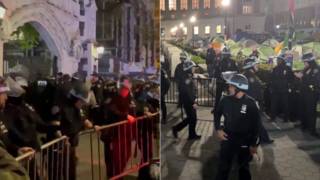
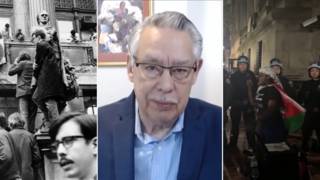
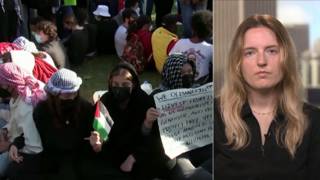






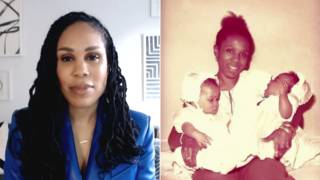
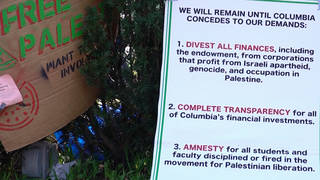
Media Options